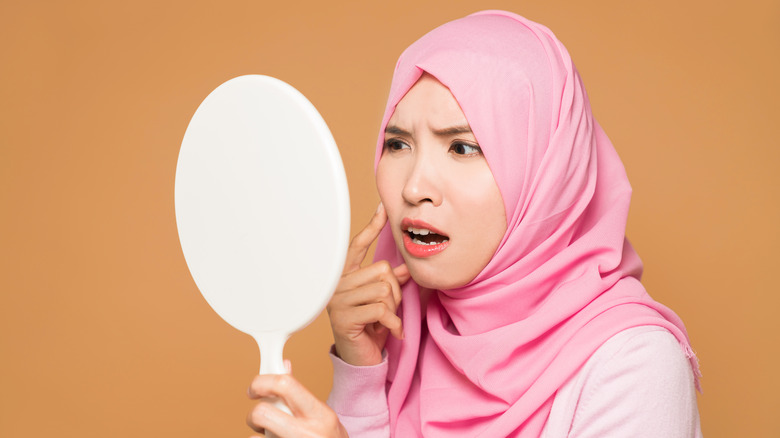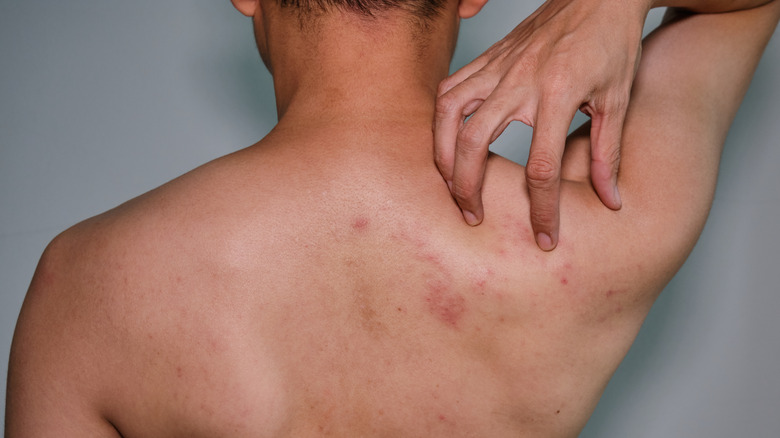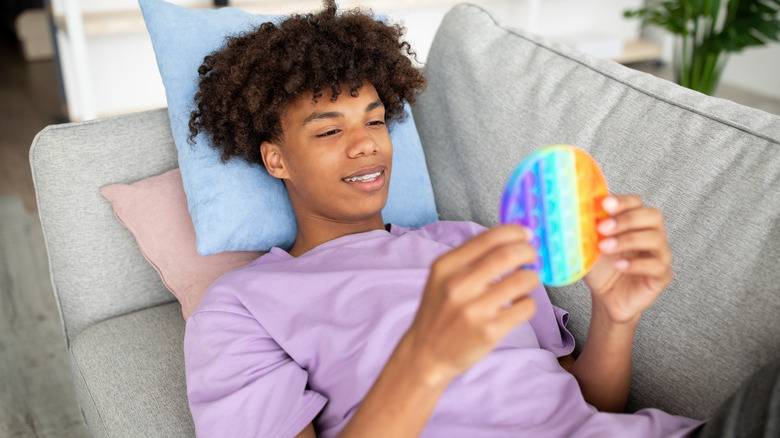What Causes Your Acne To Itch?
You're not alone if you find yourself scratching at the acne on your face or body. Approximately 70% of people with acne have reported a degree of itching alongside their acne. According to a 2008 study published in the Journal of the European Academy of Dermatology and Venereology, many people have described the sensation as tickling or tingling. Interestingly, over 80% of the participants in the study reported that their acne itched most around midday and that, at times, it affected their mood, akin to how bothersome a mosquito bite can be.
Acne is a skin condition that is inflammatory in nature and occurs when hair follicles, or pores, become clogged just below the skin, usually with a combination of oil, bacteria, dirt, and dead skin cells, per the National Institute of Arthritis and Musculoskeletal and Skin Diseases. Usually, the body can shed old cells without issue, but pustules or lesions can occur when they become trapped within pores alongside oil and other substances. The result is acne that can present as whiteheads, blackheads, or cysts. When hair follicles become plugged, the pore and surrounding area become inflamed and can cause redness, swelling, pain, and itchiness. Most acne occurs on the face, back, shoulders, and chest and generally affects teenagers and young adults, though many people continue to experience acne in adulthood. Stress, hormones, diet, irritants, and family history can all contribute to acne. But what makes acne itch?
Why acne itches
There are many reasons acne may itch. Most often, itchy acne is caused by the very nature of pores becoming filled with foreign agents. Since acne is often caused by pores becoming clogged with dead skin cells, the friction of the old skin cells within your pores can create inflammation and itching, reports Healthline. On the flipside, itchy acne can also be a sign that your unwanted zits are healing and will soon vanish. The new skin is created as your body sheds old skin cells around pimples and the dead skin cells trapped within pores. Shedding old skin cells can cause itching as the dead skin cells slough off. Cystic acne, which can involve intense inflammation below the skin's surface, can lead to itching as swelling increases. A dermatologist can recommend treatment options, including cortisone injections to decrease inflammation.
Itchiness can also result from acne treatments — especially those containing benzoyl peroxide, salicylic acid, and retinoids — whose side effects include itchiness and drying of the skin (via Medical News Today). Always use moisturizer in your daily skincare routine when using products that may result in mild irritation, which encompasses many acne treatments. Itching and other uncomfortable side effects can be minimized or avoided by moisturizing the drying and peeling skin. You may be allergic to the product if the irritation is severe or you experience other symptoms like hives or burning. In that case, you should immediately stop using it and seek medical attention.
How to avoid itching
The best approach to combating itchy acne is treating the root cause and incorporating healthy habits to reduce itching. Medical News Today advises that any consistent itching from acne, or any other reason, should not be ignored. If you have sensitive skin or itchy acne comes after using a specific product, try switching to a gentle product that doesn't contain irritation-causing ingredients. You should prioritize healthy habits when it comes to sun exposure, like consistently applying sunscreen and wearing a hat when outside, since sunlight can increase dryness and sensitivity of the skin and lead to itching. Other remedies for itchy acne include applying anti-itch creams like hydrocortisone cream or ointment, using a cool compress, and taking lukewarm baths.
Because scratching and picking at pimples are based on a grooming behavior to remedy the affected area, it can be challenging to become aware of urges to scratch or pick, but having alternative outlets for directing your energy and desire to scratch can keep itching at bay and therefore keep acne from becoming more inflamed or irritated (per The Mighty). One way to redirect your focus when you feel the urge to scratch is to have a fidget toy or item on hand. While it may seem like fidget toys are designed for children, they can be effective in helping you refrain from behaviors like scratching, itching, and picking that can make an acne breakout worse (plus, fidget spinners are fun to play with, no matter your age!).



